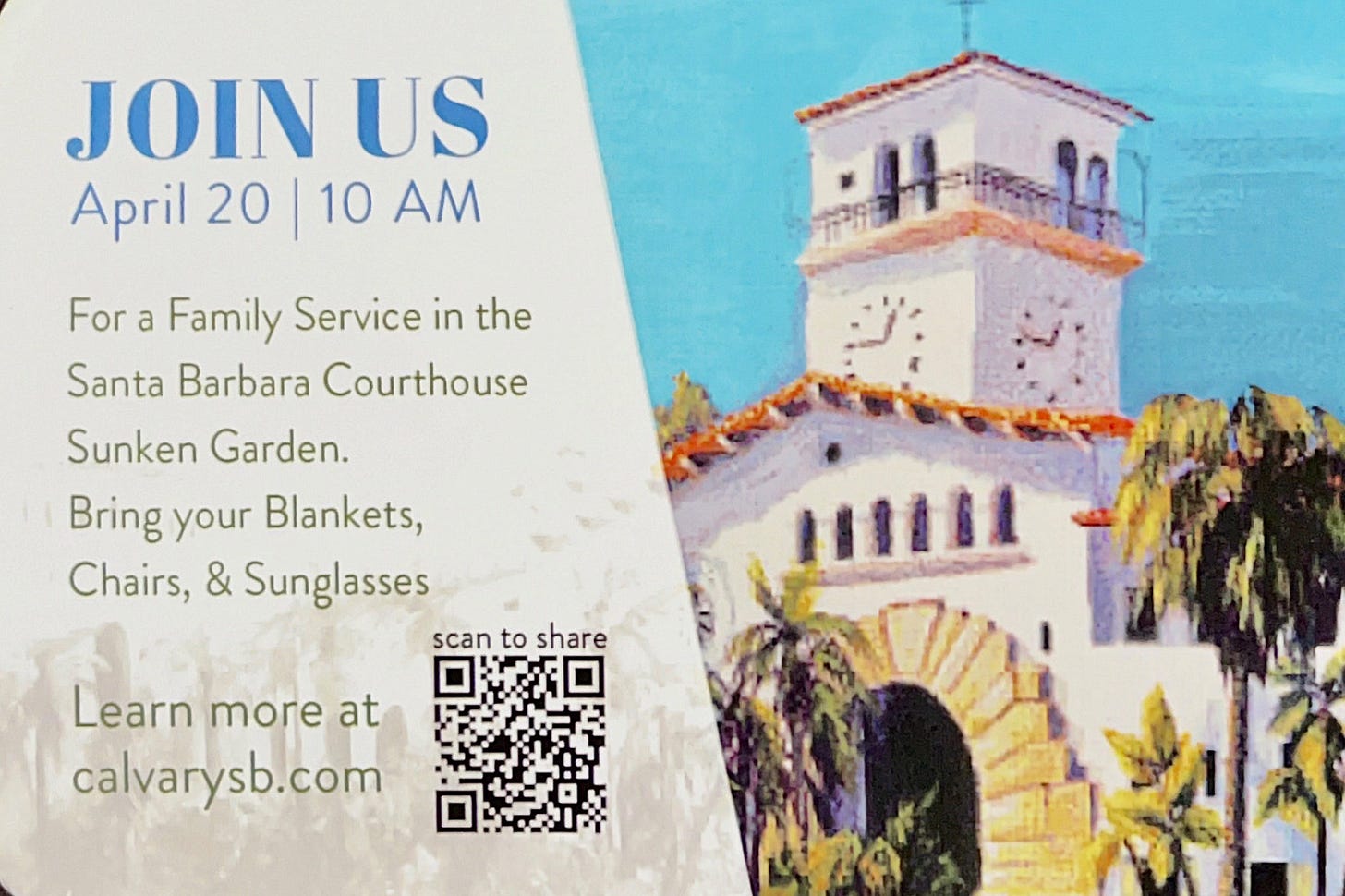Easter: The Most Important Day of the Year
By Mary Hudson
Christianity is the world's largest religion, accounting for one third of the global population. Tomorrow – Easter Sunday – will be a celebration of the most important day on the Christian calendar.
The word “Easter” appears once in the King James Bible; the Jewish people referred to it as Passover. And of course, Jesus was Jewish. In Acts 12:4, where Herod imprisoned Peter, “And delivered him to four quaternions of soldiers to keep him: intending after Easter to bring him forth to the people…” Even Herod must have known what a sacred time Easter was to first-century Christians. Herod's plans failed because a group of strong prayers stood firm:
“The church went into a season of intense intercession, asking God to free him…” Acts 12:5 TPT
Prayer can make all the difference in your life.
Then the Lord sent Peter an angel into his jail cell where he was sound asleep. He was bound with chains, and two guards were stationed on either side of him. But that didn’t stop the angel of God. He shone a light on Peter and told him to get up quickly. His chains fell off his hands, the angel said get dressed and follow me. Peter did, the gates opened in front of them to the city and the guards didn’t notice his escape. So, if you are ever in a seemingly dead-end situation, know that nothing is impossible with God.
Presidential Words
President Ronald Reagan talked about Easter in 1983:
“This week Jewish people have been celebrating Passover. This feast reminds us of the battle against oppression waged against the Jews since ancient times.” (Which again has been rearing its ugly head of antisemitism in American Colleges and Universities this past year.)
“And Christians have been commemorating the last momentous days leading to the crucifixion of Jesus 1950 years ago. Tomorrow as morning spreads around the planet, we’ll celebrate the triumph of life over death, the Resurrection of Jesus.”
President Donald Trump put out his 2025 Easter statement, reading like this:
“During this sacred week, we acknowledge that the glory of Easter Sunday cannot come without the sacrifice Jesus Christ made on the cross. In His final hours on Earth, Christ willingly endured excruciating pain, torture, and execution on the cross out of a deep and abiding love for all His creation. Through His suffering, we have redemption. Through his death, we are forgiven of our sins. Through His resurrection, we have hope of eternal life. On Easter morning, the stone is rolled away, the tomb is empty, and light prevails over darkness – signaling that death does not have the final word.”
A Jewish day began at sunset and lasted until the next sunset. Jesus celebrated the Passover meal with his disciples in the evening. Then in the morning He was crucified – on the day of Passover. Paul the apostle wrote in 1 Cor 5:7 “For even Christ our Passover is sacrificed for us.”
The Most Painful Roman Torture
Crucifixion was reserved for slaves and rebels. Dr. Alexander Metherell, MD., PhD, wrote “The pain was unbearable… In fact, it was literally beyond words to describe; they had to invent a new word: “excruciating.” Literally, excruciating means “out of the cross.” Cicero called crucifixion, “the most cruel and hideous of tortures.” Historian Will Durant wrote that “even the Romans…pitied the victims.”
Isaiah 53:4 & 5 reads “Surely, He took our pain and bore our suffering, yet we considered Him punished by God, stricken by Him and afflicted. But He was pierced for our transgressions, he was crushed for our iniquities; the punishment that brought us peace was on Him and by His wounds we are healed…”
This is a scripture many Christians pray for healing.
Sir Lionel Luckhoo (1914-1997) was listed in the Guiness Book of World Records as the world’s most successful criminal attorney. He wrote:
“The bones of Muhammad are in Medina, the bones of Confucius are in Shantung, the cremated bones of Buddha are in Nepal. Thousands pay pilgrimages to worship at their tombs which contain their bones…
“But in Jerusalem there is a cave cut into the rock. This is the tomb of Jesus. IT IS EMPTY. YES, EMPTY! BECAUSE HE IS RISEN! He died, physically and historically. He arose from the dead and now sits at the right hand of God.”
Prophecies Fulfilled
One-third of the Bible is filled with prophecies, with over 300 of them specifically about the Messiah. And 27 of them were fulfilled in one day. That one person could fulfill just eight prophecies is considered a statistical impossibility.
Josh and Sean McDowell’s book, “Evidence that Demands a Verdict,” quotes Professor Peter W Stoner, Chairman of the math department of Pasadena City College: “We find that the chance that any man might have lived down to the present time and fulfilled all 8 prophecies is 1 in 10 to the 17th power. That is one with 17 zeros behind it.”
Also, many non-Christian ancient sources confirmed details of Jesus’ death by crucifixion; He was buried: His death caused the disciples to despair and lose hope, believing that His life was ended. But the tomb was empty three days later and the disciples had experiences seeing the literal appearance of the risen Jesus for 40 days after that. This was catalogued by Dr Gary Habermas from such sources as:
Josephus 37-100 AD
Suetonius 70-160 AD
Pliny the Younger 61-113 AD
Tacitus 56-120 AD
Mara Bar-Serapion 72 AD
Lucian 125-180 AD
The Babylonian Talmud
Piecing together these non-biblical sources, they confirm the key points of the gospel.
Praise the Lord, Jesus is alive and seated at the right hand of the Father. He is ever interceding for you and me. With this in mind, have a great day celebrating His Resurrection tomorrow!
•••
Keith and Mary Hudson host a worship “Gathering” at the Montecito Library on Sunday nights at 6 pm. There won’t be a service on Easter Sunday but the following week on April 27, The Gathering will start up again every Sunday night. For more information call (951) 522-8395.
•••
Easter and the Fulfillment of God’s Promises
by Jason Lekas
Every year around this time, Easter captures the imagination of the world as nearly 3 billion Christians remember and celebrate the life, death, and—more importantly—the resurrection of Jesus at Calvary ties together thousands of years of prophecy, hope, and divine love. It’s more than just a tradition or a religious holiday. It marks the near-completion of a story that stretches back thousands of years—a story of promise, of redemption, and of God’s unwavering love.
This season reminds us that the God of both the Old and New Testaments has always been intimately involved in the affairs of mankind. Throughout history, He has declared His love and faithfulness through promises that shape the foundation of our faith.
In Genesis, God told Noah He would never again destroy the earth by flood. He spoke to Abraham and said that through his descendants, all the nations of the earth would be blessed. He gave Moses the Law and promised that those who followed it would be blessed. And later, He promised King David that his dynasty would endure—that his throne would be established forever. None of these were empty words. These were markers along the way, pointing to something greater.
They were all pointing to Jesus.
When Jesus came, He fulfilled each of these promises in ways that no one could have anticipated. God promised not to destroy the world—Jesus came to save it. God told Abraham that his lineage would bless the nations—Jesus, the Messiah, was born from that line and brought hope to all people. The Law given to Moses was never meant to be a finish line—it was a mirror, showing us our need for grace. Jesus came teaching that the heart of the Law is to love God with everything we have, and to love our neighbor as ourselves. He didn’t abolish the Law; He completed it.
God didn’t stop there. Through Jesus, He made new promises—ones that we still cling to today. He promised eternal life to all who believe in Christ as Savior. He promised that His Spirit would dwell within us, guiding us and comforting us. He promised that our sins would be forgiven through the sacrifice Jesus made. And He promised that Jesus would return—to judge the world, to set things right, and to establish His kingdom forever. He promised us an inheritance in heaven. He promised peace in the midst of chaos. He promised strength when we are weak, and that He hears us when we pray.
These promises aren’t just nice ideas—they’re deeply personal truths that have carried believers through every kind of season.
And Scripture never left these promises vague or abstract. The coming of Jesus was described in remarkable detail, centuries before it happened. In Genesis, God told Abraham that his seed would bless the world. In 2 Samuel, God told David that his line would lead to an eternal throne. In Micah, we’re told a ruler would come from Bethlehem. Isaiah tells of a virgin who would bear a son called Immanuel—God with us—and later describes this child as the Wonderful Counselor, Mighty God, Everlasting Father, Prince of Peace. Daniel speaks of a “Son of Man” coming on the clouds to receive an everlasting kingdom. Psalms foreshadows Jesus’ crucifixion, even quoting the words He would later cry from the cross: “My God, my God, why have you forsaken me?”
Over and over again, the Scriptures point us to Jesus.
Isaiah paints the picture of the suffering servant—despised and rejected, pierced for our transgressions, bearing our iniquity. Zechariah speaks of the one “whom they have pierced,” and Deuteronomy foretells a prophet like Moses who would speak God's very words. Psalm 2 echoes the voice of the Father: “You are my Son; today I have begotten you.” Zechariah describes a humble king riding into Jerusalem on a donkey. Psalms and Isaiah even point to His resurrection and ascension into heaven.
This isn’t just biblical poetry. Even outside of Scripture, the story of Jesus echoes through history. The Jewish historian Josephus, writing around 93 A.D., described Jesus as a wise man who did incredible works and drew people from both Jewish and Gentile communities. He wrote that Jesus was crucified under Pontius Pilate, and that His followers claimed He appeared to them three days later—just as the prophets had foretold.
The circumstances of Jesus’s life, death, and resurrection weren’t random. They were foretold—boldly, repeatedly, and in detail—throughout both the Old and New Testaments. And all of it leads us here: to Easter.
So Easter isn’t just a symbolic day on the calendar. It’s the moment we remember that Jesus—the Messiah, the fulfillment of every promise—came to bring good news to the poor and liberty to the captives. He came to show us the heart of God. He came to give us life—and not just someday, but life abundant right now.
This Easter, we celebrate not only that Jesus lived and died, but that He rose again. His message was one of love—for the whole world. He came to break the chains of sin and shame. He came to give us something greater to hope for.
He came to give us eyes to see and hearts to understand that God’s kingdom isn’t just in the distance. It’s already among us. It’s present in the way we’re called to treat each other, in the hope we carry, and in the love we show.
And when the world feels upside down—when suffering surrounds us and the future feels uncertain—we find our comfort in the person of Jesus. Not because He removes our pain, but because He walks with us through it. He gives us the strength to keep going, and the perspective to see that while eternity awaits, we don’t have to wait to start living in it.
Not if we don’t want to.







The title here is:
The most important day of the year.
I agree!
How about A bigger truth?
The most important day or event in human history!!!
Happy Easter 🙏
Jason, as I read your devotion to Jesus this morning I am reminded that you know what it is to walk in the Valley but keeping your eyes fixed on Jesus, in a deep way. The hope we hold on to, in Jesus, is the hope that allows us to keep walking through the Valley. And not pitch a tent there but keep walking through. Blessings and love.